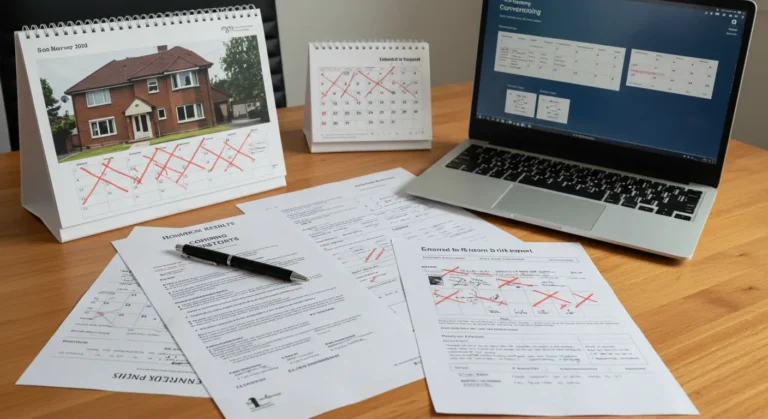🏡 How Long Do Searches Take When Buying a House?
Buying a home in the UK can be thrilling… until the waiting begins. One of the most frustrating parts? The property searches. So, how long do searches take when buying a house exactly?
Typically, you’re looking at 2 to 6 weeks, depending on where the property is located, how fast your solicitor moves, and whether the local authority is stuck in the Stone Age (read: paper files).
But there’s more to it than just waiting for a couple of documents. This article breaks down every step of the UK property buying process, especially the role of legal house searches, and what you can do to speed things up.
🧾 What Are Property Searches?
If you’re unfamiliar with property conveyancing, here’s the gist: your solicitor carries out several official checks (aka “searches”) with local authorities and utility providers to make sure the home you’re buying doesn’t come with hidden legal or environmental risks.
These legal house searches are essential because they help uncover:
- Outstanding planning permissions
- Flood or subsidence risks
- Drainage and water supply issues
- Contaminated land or nearby landfills
- Road schemes or future developments
Whether you’re a first-time buyer or an experienced mover, these searches form a critical part of your overall house purchase timeline.
⏳ How Long Do Searches Take When Buying a House?
On average, searches take 2 to 6 weeks to complete, depending on how efficient your solicitor is and how quickly the relevant council responds. In rare cases (particularly in fast-moving boroughs), searches can be completed in under 10 working days — but that’s the exception, not the rule.
Here’s a rough breakdown:
| Search Type | Average Timeframe |
|---|---|
| Local Authority Search | 2–5 weeks |
| Environmental Search | 24–48 hours |
| Water & Drainage Search | 3–10 working days |
If you’re in a high-demand area like London, Leeds, or Manchester, delays can hit even harder due to backlogs in UK property buying process.
📂 The 3 Essential Searches in Conveyancing
1. Local Authority Search
Covers planning history, building regulations, traffic schemes, conservation areas, and more. This is the most detailed search and often the slowest.
2. Environmental Search
Checks the land for issues like flood zones, subsidence, land contamination, and industrial history.
3. Drainage and Water Search
Confirms whether the property is connected to public sewers and water mains. This search also reveals whether there are any public drains running under the property — which could affect future extensions or garden builds.
These three combine to give a full legal overview, essential for both you and your lender before you commit to signing contracts.
🐌 Top 5 Causes of Delays in House Purchase Timeline
- Slow Local Councils
Some councils still rely on manual records, which can cause weeks-long delays in delivering search results. - Incomplete or Incorrect Forms
If your solicitor sends incorrect information to the council, the request will bounce back, wasting valuable time. - High Demand Seasons
Spring and summer often see spikes in UK property transactions, which can create backlogs across the system. - Unforeseen Environmental Flags
A property located in a floodplain or conservation zone may trigger further checks — delaying the process. - Inefficient Solicitors
Let’s face it: not all conveyancers hustle. Some sit on your file until nudged, dragging out the entire property conveyancing timeline.
⚡ Speeding Up the Legal Search Process
Here’s how to reduce the stress:
- ✅ Instruct your solicitor early — ideally as soon as your offer is accepted.
- ✅ Ask if personal searches are faster in your area.
- ✅ Use a conveyancer with online access to council systems — they get data faster.
- ✅ Check if Search Insurance is available. It allows the transaction to proceed even before search results are in (not all lenders accept it).
🔚 After the Searches: What Happens Next?
Once the results are back:
- Your solicitor reviews everything
- They flag any concerns
- If all is well, you move toward contract exchange
- Once contracts are exchanged, the deal becomes legally binding
- Then it’s just final checks, money transfers, and completion day 🎉
That’s the light at the end of the tunnel in your UK property buying process!
Read More : Discover the Charm of Baumber Walled Garden: A Hidden Gem in Lincolnshire
❓ FAQs
Q1: Can I skip property searches if I’m a cash buyer?
Yes — but it’s extremely risky. You’d be blind to planning or environmental issues.
Q2: Are legal house searches really necessary for leasehold properties?
Absolutely. Leaseholds may have more restrictions and shared land issues. Searches are vital.
Q3: Can I request expedited searches?
Sometimes. Some councils offer fast-track services — but they may charge a premium.
Q4: Are online conveyancers faster than traditional solicitors?
Often, yes. Digital platforms can streamline the property conveyancing process by automating document sharing and status updates.
Q5: Do all mortgage lenders require full searches?
Most do. Some may allow limited searches or indemnity insurance in rare cases.
With that said, thanks for reading — and until next time, may your searches be short and your keys come quick! 🔑📑

